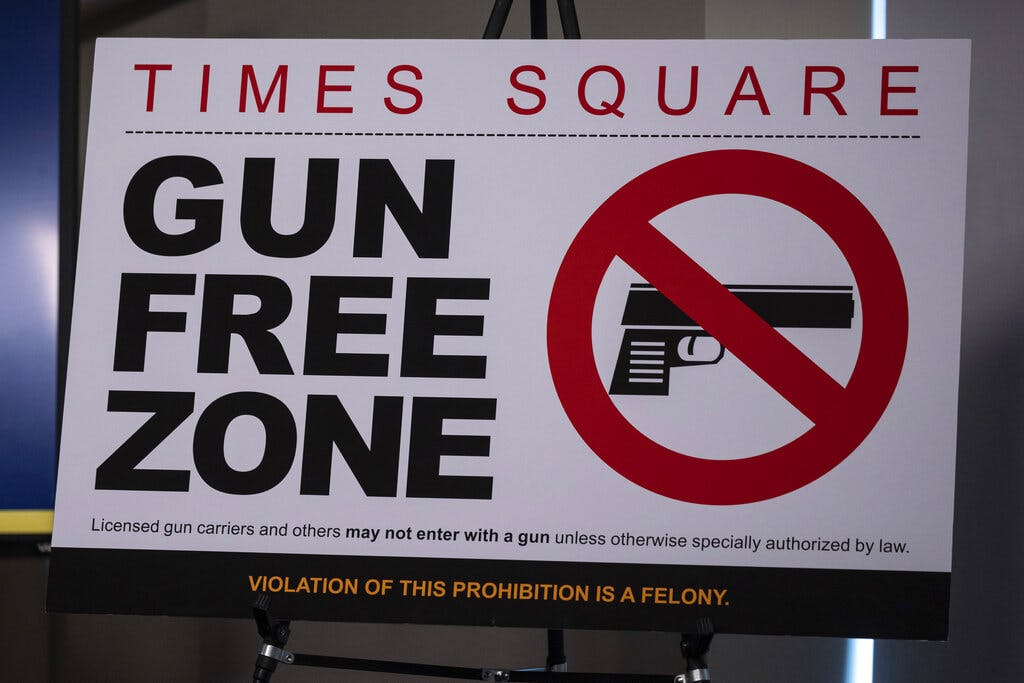Supreme Court Declines To Step In on New York Gun Rights Case
‘I understand the Court’s denial today to reflect respect for the Second Circuit’s procedures in managing its own docket, rather than expressing any view on the merits of the case,’ Justice Alito says in a dissent.

The Supreme Court will not hear a case from New York gun owners, leaving Second Amendment law to be settled in lower federal courts across the country. As other such cases make their way through courts in New York, New Jersey, Oregon, and Illinois, the justices have decided to stay out of the first dispute to reach the high court — for now.
The court declined to intervene on procedural grounds, giving the Second Circuit of the United States Court of Appeals the chance to weigh the case. Two justices dissented, including Justice Clarence Thomas, who in June penned the court’s ringing defense of the Second Amendment in New York State Rifle & Pistol Association v. Bruen.
Justice Thomas’s ruling struck down New York’s strict gun-permitting regime, prompting the state — and others with similar policies — to draft new regulations, which are now in dispute in the courts.
Justice Samuel Alito, writing for himself and Justice Thomas, said that the Second Circuit had erred in allowing much of New York’s post-Bruen gun law to take effect with no explanation. “I understand the Court’s denial today to reflect respect for the Second Circuit’s procedures in managing its own docket, rather than expressing any view on the merits of the case,” Justice Alito wrote.
He added that, considering the Second Circuit has yet to offer a timeline for hearing the appeals case, gun advocates “should not be deterred by today’s order from again seeking relief if the Second Circuit does not, within a reasonable time, provide an explanation for its stay order or expedite consideration of the appeal.”
The case, Antonyuk v. Nigrelli, reached the Supreme Court when Second Amendment advocates appealed the decision by three judges on the Second Circuit to allow key elements of New York State’s new gun law, the Concealed Carry Improvement Act, to go into effect.
Two federal district court judges had previously blocked major sections of the law, saying they were unconstitutional.
These provisions included limits on where guns could be legally carried — for example, houses of worship and even an expanded Times Square district — requiring applicants for a gun permit to demonstrate “good moral character,” and allowing the state to review applicants’ social media accounts.
The attorney for Saint Lawrence County in New York, Stephen Button, who was an unpaid legal advisor to the gun rights advocates, told the Sun that “there is some promising language” in the note attached by Justices Alito and Thomas. “They describe the [lower court] decision as ‘thorough,’ which, in my mind, translates to accurate,” Mr. Button said in a phone interview.
“It is notable that at the conclusion of the comments made by Alito and Thomas, they call for this case to be expedited through the Second Circuit, otherwise we can seek relief from the Supreme Court again,” Mr. Button added.
Gun owners had asked that the CCIA not be allowed to take effect while the appeals process plays out. Two different district courts found the law to be unconstitutional, and the appeals process has not yet yielded a result.
Just before Christmas, Second Amendment advocates filed their case for emergency administrative relief with Justice Sonia Sotomayor — the justice for the Second Circuit. The gun rights groups said that the court of appeals overstepped in allowing the CCIA to take effect.
The Second Amendment group said “the express purpose of the Concealed Carry Improvement Act was to defy, repudiate, circumvent, and undermine this Court’s decision in New York State Rifle & Pistol Association v. Bruen.” It also called the New York case a “futile effort at damage control.”
New York’s attorney general, Letitia James, defended the Second Circuit judges’ decision, writing that the CCIA will “make necessary changes to the State’s firearms licensing and possession laws following this Court’s decision” in Bruen.
Following the Bruen decision, Governor Hochul said she would not “back down” in her efforts to restrict gun rights or “cede” ground to the Supreme Court. The gun rights groups say that these words describe an intent by Ms. Hochul to circumvent the courts while claiming to be acting in the public interest.
The president of the Citizens Crime Commission of New York City, Richard Aborn, told the Sun, “The Supreme Court does not want to micromanage every state legislature. Not even the most conservative justices want that.”

